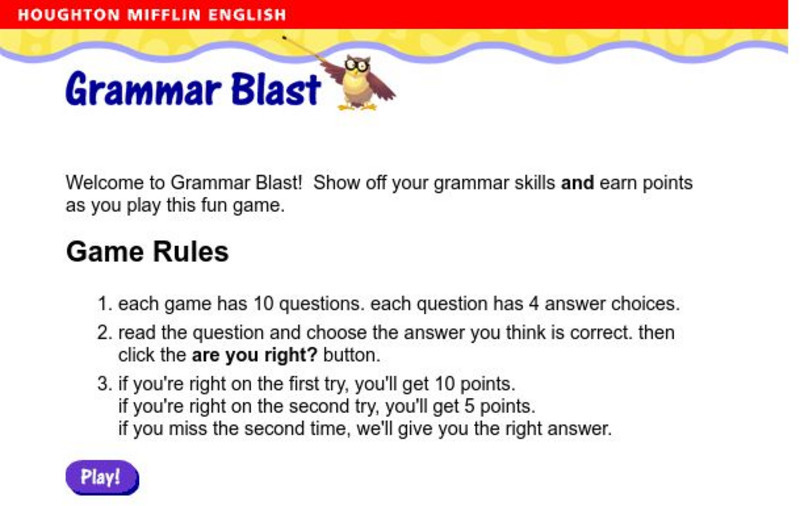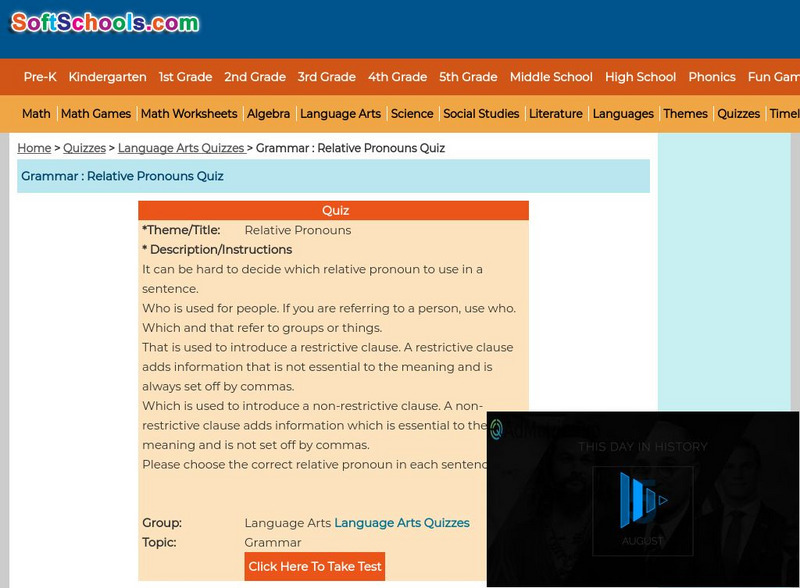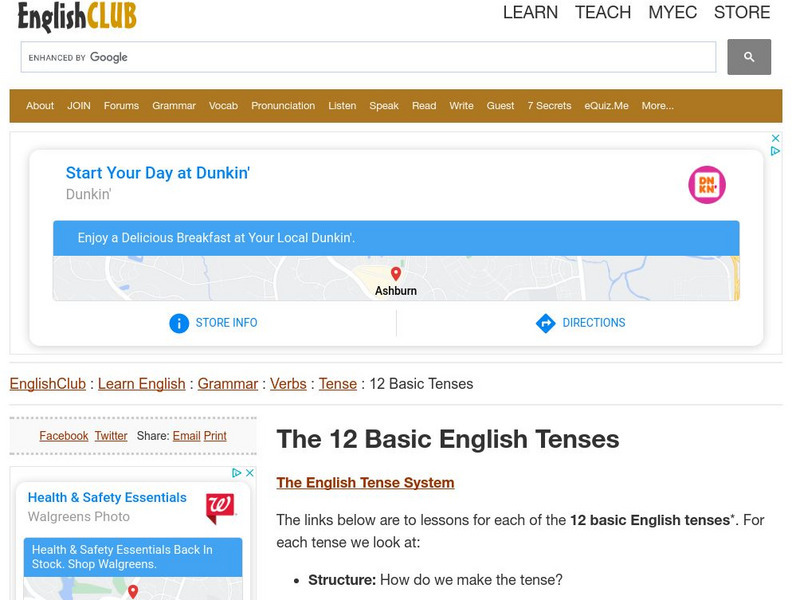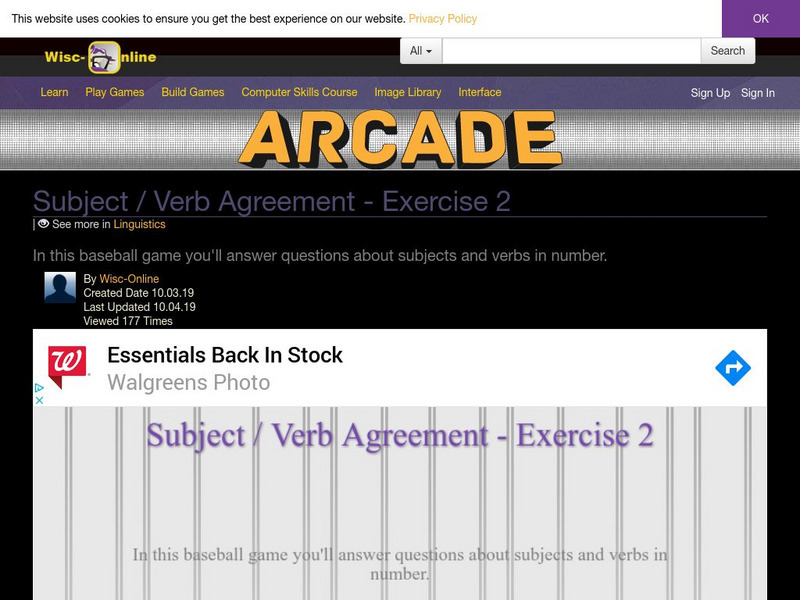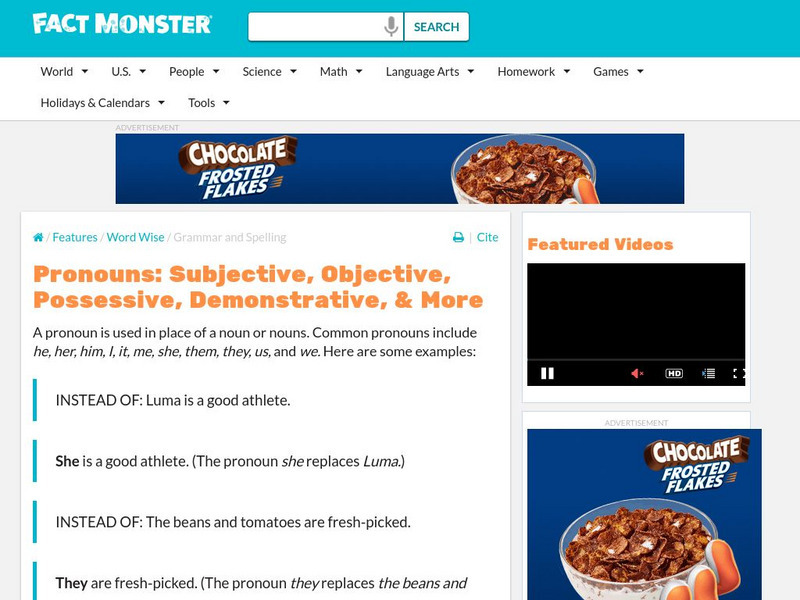Other
Kim's Korner: Color Coded Parts of Speech Kinesthetic Lesson Plan
Students can brush up on their knowledge of the parts of speech when they do this lesson. This site contains a kinesthetic lesson plan that caters to children with all types of learning styles.
University of Victoria (Canada)
University of Victoria: Regular Plurals of Nouns
Learn how to make nouns plural. This concise lesson explains the process and contains a chart with examples. Practice your new skill with exercises at the bottom of the page.
Education Place
Houghton Mifflin: Eduplace: Grammar Blast: Adjectives and Adverbs
A quiz to assess student understanding of adjectives and adverbs is included on this site.
Soft Schools
Soft Schools: Relative Pronouns
Learn about relative pronouns, then take a short quiz to check mastery.
English Club
English Club: Learn English: Grammar: Verbs: The 12 Basic English Tenses
Information about verb tenses and links to additional information about present, past, and future tenses.
E Reading Worksheets
E Reading Worksheets: Pronoun Worksheets
In this learning module, students will learn more about pronouns. Video lessons and reinforcement worksheets are provided. This module is designed to support Tier I, Tier II, and Tier III students in various grade bands.
Other
Woodward English: Spelling Rules: Ing
Rules, exceptions, and examples of how to add -ing to verbs, dependent on the ending of the original word.
Government of Canada
Language Portal of Canada: Subject Verb Agreement With Collective Nouns
Learn about collective nouns and practice choosing the right verb form for the collective noun-subject in each sentence.
Grammarly
Grammarly Blog: Common Prepositions
This Grammarly Handbook resource provides a list of prepositions.
Grammarly
Grammarly Blog: Future Perfect Tense
This page explains what future perfect tense means and how it is formed.
Grammarly
Grammarly Blog: Sometime, Sometimes, and Some Time
An explanation with examples of using the words "sometime," "sometimes," and "some time" correctly in sentences.
Grammarly
Grammarly Blog: Everyone vs. Every One
This article provides the rules for the proper use of the words "everyone" and "every one" with examples.
Grammarly
Grammarly Blog: Verb Tense Consistency: Grammar Rules
This page focuses on the need for verb tense consistency on a clause level. It is important to maintain the same verb tense in a clause; if the time changes, use a second sentence.
Grammarly
Grammarly Blog: Common Errors in English: Bad or Badly
This Grammarly Handbook resource clarifies the difference in usage between "bad" and "badly" in sentences. Numerous examples are provided in this resource.
Grammarly
Grammarly Blog: Adjective and Verb Placement
This page focuses on the relationships between adjectives and verbs including predicate adjectives, linking verbs, and participles --verbs used as adjectives such as the smiling baby.
English Club
English Club: Learn English: Grammar: Verbs: Tense: English Tense System
Information about verb tenses with links to additional information: Tense and Time, Basic Tenses, Regular Verbs, Irregular Verbs, and Be.
Other
English Grammar 101: Adverbs Modifying Verbs
Learn how adverbs modify verbs in this concise lesson. Practice what you learn with a quiz which gives immediate feedback.
Khan Academy
Khan Academy: Pronoun Antecedent Agreement
Test your knowledge on pronoun-antecedent agreement with this Khan Academy quiz. If you encounter a tricky problem, watch a video or request a hint!
Other
Indiana University of Pennsylvania: Writing Center: Shifty Tenses
Notes about verb tense, when it should and should not be changed, and what tense is best to use when writing about literature.
University of Victoria (Canada)
Study Zone: Parts of Speech
Nice brief visual summary of the parts of speech - clear and concise - followed by an interactive practice quiz to reinforce concepts - great for ELL - has links to more in-depth explanations.
Wisc-Online
Wisc Online: Subject Verb Agreement Exercise 2
This is a 20-question exercise/quiz matching subjects and verbs in number.
Fact Monster
Fact Monster: Pronouns: Subjective, Objective, Possessive, Demonstrative, Etc.
This grammatical reference shares definitions of each type of pronoun. Each category of pronoun includes several examples. The following types of pronouns are included: demonstrative pronouns, indefinite pronouns, intensive pronouns,...
Other
Grammar Monster: What Are Possessive Pronouns?
Get a better understanding of possessive pronouns with definitions, examples, lists, antecedents, and a five-question quiz.



